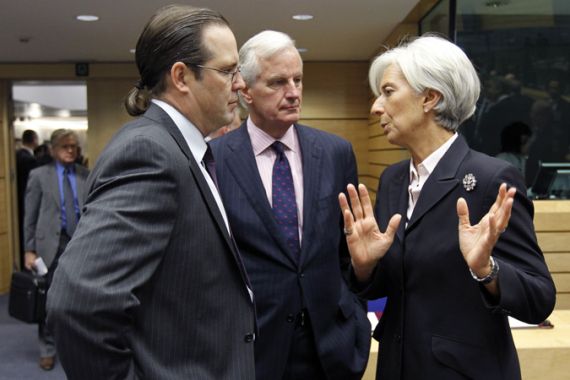EU leaders open talks on economic crisis
Italy to face pressure at Brussels summit to speed up reforms to avoid a Greece-style meltdown.

Expectations are low as European leaders open talks in Brussels aimed at finding a solution to the worst economic crisis in the region’s history.
The spotlight in the Belgian capital was on Italy on Sunday amid concerns grow that the eurozone debt crisis could spark a global recession.
Keep reading
list of 4 itemsInside the pressures facing Quebec’s billion-dollar maple syrup industry
Manipur’s BJP CM inflamed conflict: Assam Rifles report on India violence
Marcos Jr treads fine line with China as Philippines deepens US, Japan ties
Though European leaders appeared to be resolving their differences and moving towards a deal, German Chancellor Angela Merkel played down expectations of a breakthrough.
“We should not expect eurogroup decisions today, but rather on Wednesday,” she said.
Shortly before the talks began, Silvio Berlusconi, the Italian prime minister, was called in for talks with Merkel; Herman Van Rompuy, the EU president; and Nicolas Sarkozy, the French president.
EU finance ministers have “agreed in principle” to a framework to recapitalise banks to help resolve a debt crisis that threatens to damage the global economy, EU sources said.
“There is an agreement in principle for a bank recapitalisation of 100 billion euros,” an official said on Saturday.
A second source confirmed that a framework had been agreed to reinforce banks’ capital.
Sarkozy said on Saturday that progress had been made in talks to resolve the crisis.
“These are absolutely crucial meetings, solutions must be found, the financial situation must be stabilised. This financial crisis must be resolved,” he said.
In deadlock
The finance ministers have been in deadlock over shoring up European banks, after eurozone countries called for steeper losses for holders of Greek bonds.
With France and Germany divided over how to bolster the rescue fund that underpins the eurozone, leaders have scheduled a string of meetings in the next days to tackle Greece’s debt and limit its impact on the banking system.
Around a thousand people took part in an demonstration in front of Germany’s lower house of parliament on Saturday, to show their unhappiness over how the government has dealt with the financial crisis.
The protesters sat out in a field in front of the Reichstag building, where the lower house of parliament, or Bundestag is housed, holding banners and flags against the country’s financial policies.
Eurozone finance ministers made some progress on Friday, agreeing that holders of Greek government bonds would need to take far more than the 21 per cent cut brokered in July.
The ministers – including those from countries not in the eurozone – tried on Saturday to decide ways to bolster the capital of European banks to cope with any Greek default and wider contagion across the continent.
EU officials say almost 100bn euros ($139bn) are required to reinforce the region’s banking system.
Banks that cannot raise money on the markets will have to turn to national governments, and finally to the European Financial Stability Facility (EFSF).
Bank recapitalisation
European banks will be required to increase their core tier one capital ratio to 9 per cent to help them withstand losses on sovereign debt, officials have said.
However, the European Commission will urge ministers not to announce a plan on bank recapitalisation before they have settled other issues, one EU official said.
These issues included the size of losses for holders of Greek bonds and how to boost the firepower of the eurozone’s rescue fund, the EFSF.
Three of the EU executive’s top officials – Olli Rehn, monetary affairs head; Michel Barnier, the commissioner in charge of financial regulation; and antitrust chief Joaquin Almunia – will deliver this message at the meeting of EU finance ministers on Saturday, the official said.
There is also disagreement over how to recapitalise banks, in particular the extent to which taxpayers’ money should be used.
Discussions over the weekend are expected to include ways to make Greece’s debt mountain more manageable.